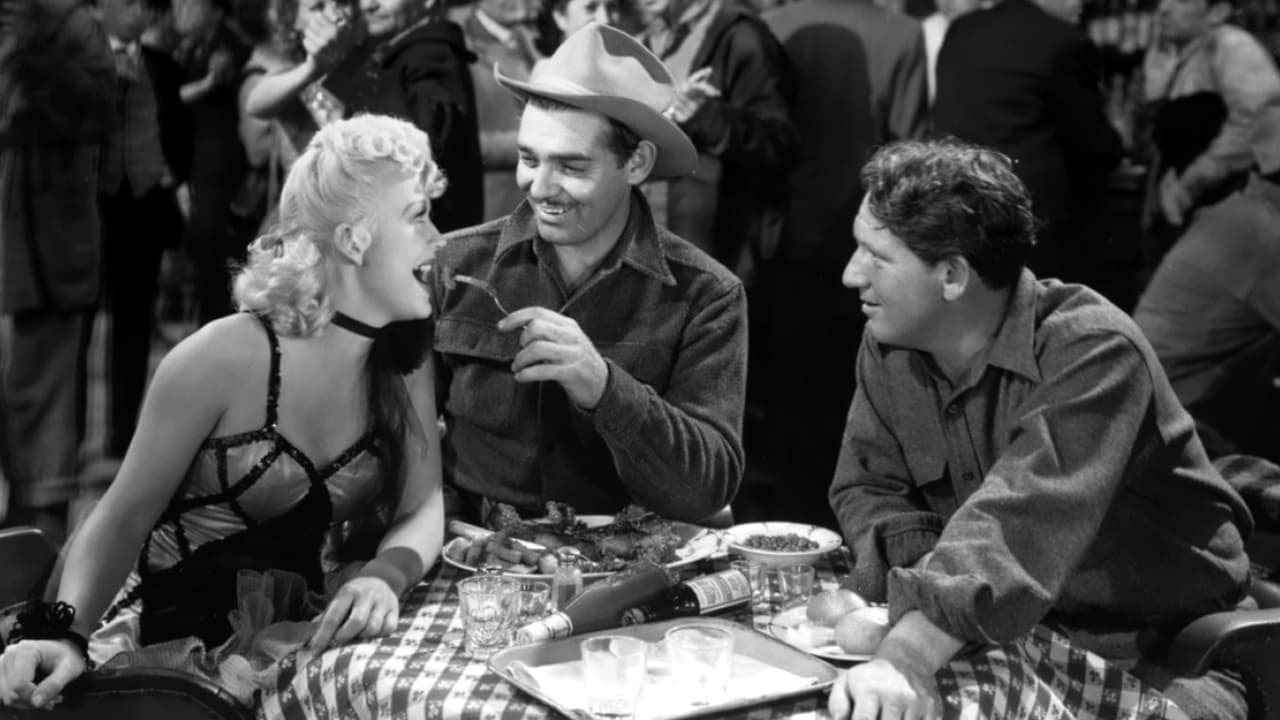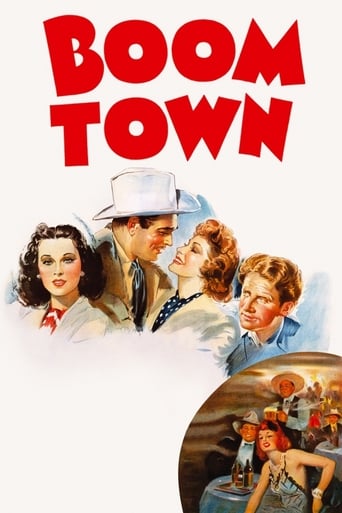

not as good as all the hype
... View MoreThe performances transcend the film's tropes, grounding it in characters that feel more complete than this subgenre often produces.
... View MoreThe story, direction, characters, and writing/dialogue is akin to taking a tranquilizer shot to the neck, but everything else was so well done.
... View MoreThere are moments that feel comical, some horrific, and some downright inspiring but the tonal shifts hardly matter as the end results come to a film that's perfect for this time.
... View MoreA chipper oldie ravishes its spectator with a gung-ho complexion that is so disarming a benignant viewer might be completely oblivious of its cut-throat capitalistic machination which is attendant with the plot's boom-and-bust vagaries. Two wildcatters Big John McMasters (Gable) and Square John Sand (Tracy) hit it off quickly (thanks to their mutual instinct of dodging potshots), and bouncily go for it in their oil rigging enterprise, there are hits and misses ongoing, but their archetypal bromance is put into a critical test when they are both besotted with the same dame, Betsy Bartlett (Colbert). The narrative cavalierly pass the buck to Betsy since Big John has no inkling that she is Square John's gal, but Betsy knows Big John alright, which doesn't stop her from jilting a more matter-of-fact Square John for the newly ignited coup-de-foudre (and it all happened one night!). Thankfully, the reunited Gable-Colbert pair knows how to play the flirtatious bonhomie right, and a bluff Tracy makes a rather surprising capitulation to the "she is not that into him" situation but is never able to get over her, instead, he becomes the watchdog of their marriage, a resolute assurer that Betsy's happiness is unadulterated. Therefore, the years-spanning story extends into a series friend-or-foe games between Big John and Square John, predicated on Betsy's well-being, hopping from places to places, their fortune alternately ebbs and flows. When at its best, an oil wildfire spectacle is surely awe-inspiring through its matted black-and-white expressionism; yet in its worst, the patchy narrative wears thin quickly when the love triangle equilibrium levels out. So an extrinsic force timely arrives in the form of Hedy Lamarr's drop-dead gorgeous Karen Vanmeer, Big John's business adviser and a socialite who is adept at eavesdropping, as an interloper, she is not beyond reproach but for once, she is presented more than a vacuous bombshell, in fact she has the wiles to apply her own counter- moves when Square John tries to buy her out.Slightly tortuous in its story-line, and 77 years have passed, Jack Conway's BOOM TOWN has sustained to evince a pristine luster in pointing up two of the most peddled attributes of America: the land of opportunity and the propitious everything-will-be-fine motto.
... View MoreMy mother grew up in the East Texas oil boom in 1935. This film closely resembles Kilgore Texas. My whole family has been in the business since the early 40's. My father was burned in an oil field explosion and recovered. The film was done well, showing all of the hard work men endured in the fields. This movie is true and correct showing the hardships of the life in the business, from being dirt poor to having the finer things in life. All of the actor's in this movie closely resemble people we have dealt with over the years. I also enjoyed seeing this move in black and white as it focused on the story line rather than a big color feature. I will definitely watch this move again as it brings home the people that risked there lives to bring a product to the people at the beginning of the industrial age with romance and a little humor. I would recommend it to anyone.
... View MoreEven all the great stars of yesterday including Claudette Colbert, Clark Gable and Spencer Tracy can't raise this picture above average and that's exactly what it is-average.I guess the dialogue is good. The story isn't bad but the woman who loves her man even though he isn't faithful or present all the time story seems very stale and tired here. Claudette can't keep her character from becoming tiring with her smooth delivery and even keeled moods.The film is quite dated in other ways. The fight scenes between Gable and Tracy seem poorly choreographed especially by today's standards. It's muck. Average muck. I guess it's okay to watch to see how films of that era were shot but there are others from the same year that are much better. I'd skip it.
... View MoreAlong with "Call of the Wild", this is my favorite Gable film(including "Gone with the Wind, made the year before). They have the similarity that we are in a wildcatting situation, looking for some treasure: gold in one case, oil in another. There is an air of tremendous excitement and optimism, which Gable epitomizes. In the one case, Gable has wisecracking Jack Oakie and later gorgeous Loretta Young as companions in the search for gold in the Yukon wilderness. In the present case, Gable teams up with an enthusiastic Spencer Tracy, and later with gorgeous Claudette Corbert. This is also one of the last films Gable made before the tragic death of his wife Carol Lombard and his entry in to WWII service. After that, Gable seemed a changed man on screen. It is also the most autobiographical film Gable did, as before his film career, he joined his father as an oil man. This film, as an epic about wildcatting in the early oil industry, invariably invites comparison with the later film "Tulsa", with the same theme. Native Oklahoman Chill Wills is the only actor I am aware of that was in both films. In both cases, the excitement begins with a gusher. Later, there is a spectacular oil field fire that threatens to wipe out fortunes. But "Tulsa" lacks anyone with the sizzling chemistry between Gable and Tracy, and also lacks the befuddled humor of Frank Morgan. Don't get me wrong. If you enjoyed "Boomtown", you should definitely check out "Tulsa". Susan Hayward is the tough-as-nails wildcat in that story, with Chill Wills as the occasional narrator. But, it tends to drag in places.The initial meeting between Gable and Tracy, going opposite ways on a one way plank that serves as a bridge across a muddy water-soaked road in a wildcat town, reminds us of the initial meeting of Robin Hood(Errol Flynn) and Little John(Alan Hale) in "The Adventures of Robin hood", in which they try to knock each other off a log crossing a stream so that they may complete their crossing. In the present case, this incident results in a draw, as both dive into the mud when bullets start flying around them. Tracy's initial offense at being called "Shorty" by Gable is soon grudgingly accepted when they share a room for the night. But woe be to anyone who parrots Gable in calling him Shorty!Comparison with yet another Gable film, "Wife versus Secretary", is also in order. In both films, Gable acquires a knockout single woman, who nearly costs him his marriage, as an indispensable assistant in his business. The difference is in the personalities of the women. Harlow's character respects his marriage enough not to encourage an affair, though appearances sometimes fuel rumors. Heddy Lamarr's character is a snake who admits to Tracy that she is determined to seduce and marry Gable's character. Happily, Gable eventually dismisses Lamarr and wife Colbert forgives him. The ups and downs of Gable's and Tracy's oil businesses, together or separate, and their relationship, constitutes much of the substance of the film. Tracy makes a memorable epic speech at Gable's anti-trust trial, which serves as the basis of a reconciliation and a hopeful finale. This speech should have been quoted in T.J. DiLorenzo's book "How Capitalism Saved America", in which he argues that anti-trust legislation has done much more harm than good.I wonder why the color poster for the main feature on my DVD shows Gable smooching Lamarr rather than Colbert? and why the color poster for the special features shows Lamarr and Tracy together(which occurred for only a few minutes in the film)? Is Lamarr considered such a superior beauty that she totally outranks Colbert? Not to my mind.
... View More